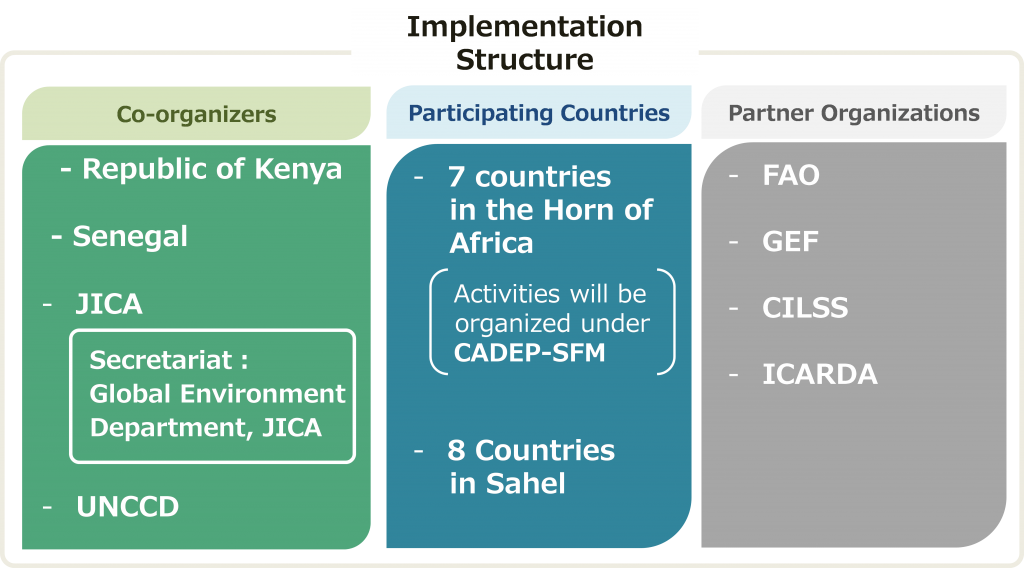Background and Objective | Activities | Implementation Structure
Background and Objective
Background
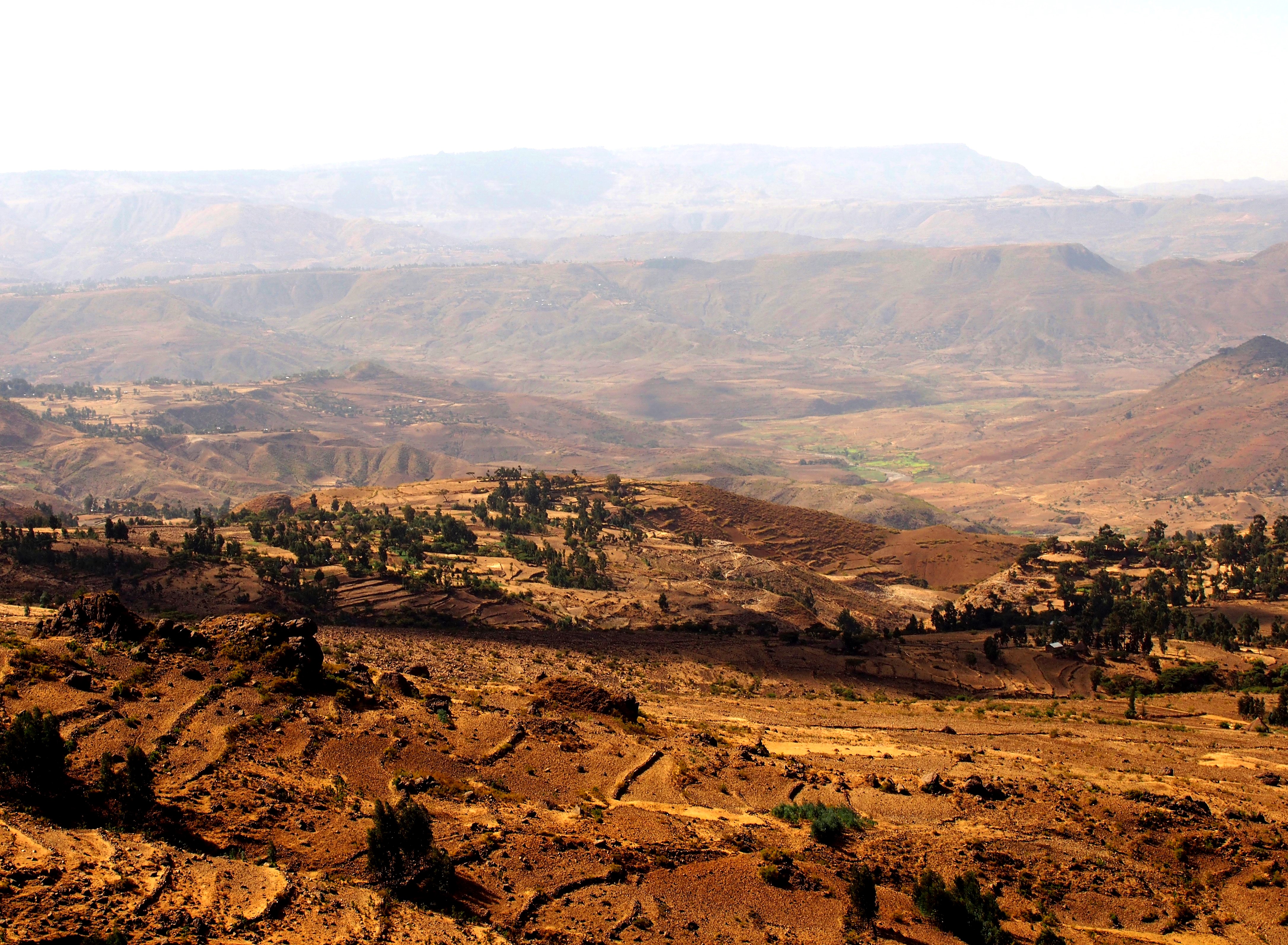
The Sahel and Horn of Africa regions face mounting developmental challenges. Environmental deterioration has made the situation worse. The major part of the region is desert or dry lands and most of it is estimated to be degraded. Additionally, the region has been affected by frequent and severe droughts in recent years. The recent climate change is likely to make desertification even worse.
As people on low incomes in the region heavily depend on natural resources, persistent drought has further worsened their livelihood condition. The poverty in the region could further exacerbate insecurity and the increase of refugees. Addressing desertification properly and strengthening resilience to climate change are keys to making nations of the region achieve sustainable development while contributing to peace and stability in the region and globally. The 2030 Agenda for a Sustainable Development pledge that promises that no one will be left behind cannot be achieved without the sustainable growth of the region.
Despite of its importance and urgency, the issues of droughts and desertification have not been given sufficient international attention and therefore, adequate financing for addressing those issues has not been mobilized. The priority of desertification and drought needs to be raised in the development agenda in African countries.
Against this backdrop, the Government of Kenya, the Government of Senegal, JICA, and the UNCCD with partner African countries and development partners officially announced the launch of the initiative at TICAD VI in Nairobi in August 2016. They agreed to work together to combat desertification for achieving the SDGs in the Sahel and Horn of Africa, contributing to mitigating poverty, and to greater peace and stability in the region and the world at large.
Objective
To contribute to making nations and communities resilient to climate change by promoting measures for combating desertification in the Sahel and Horn of Africa.
The objective will be achieved through
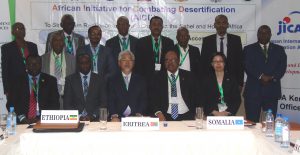
1. Building networks:
A robust network among participating countries and development partners is built for combating desertification and strengthening resilience to climate change in the Sahel and Horn of Africa, and contributing to raising global awareness of desertification
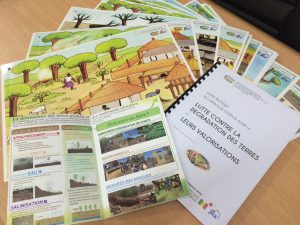 2. Knowledge-sharing:
2. Knowledge-sharing:
Knowledge and experiences on combating desertification are shared to enhance the effectiveness development efforts in the region
3. Improving access to finance
Access to available international development finance is improved to promote measures for combating desertification in the region.
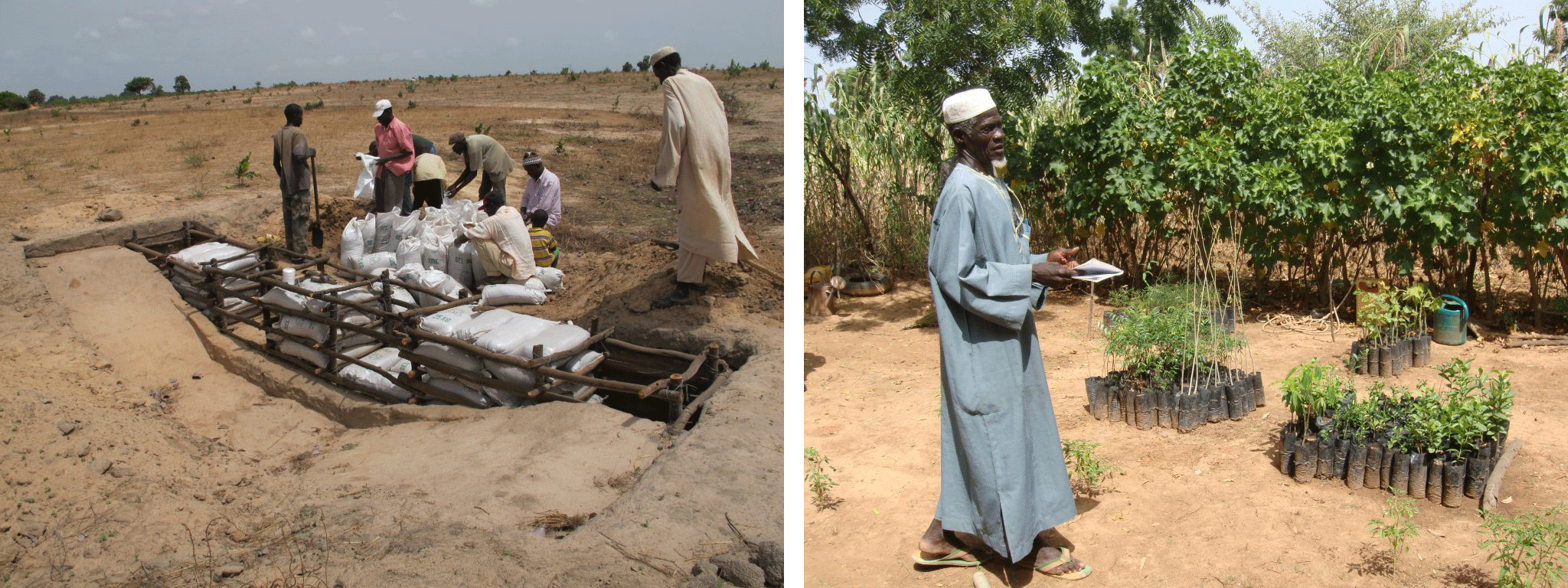
Duration
6 years: August 2016 (TICAD VI) to 2022 (until the expected TICAD VIII)
Activities
Main Activities
1. Annual workshops in the Sahel and Horn of Africa
2. High-level events / meetings on the occasion of international conferences such as TICAD, UNCCD/COPs
3. Development of tools and promotion of the use of existing tools to support networking, knowledge-sharing, and access to finance
4. Others
* Any activities under AI-CD can be implemented jointly or harmonized with other related initiatives by international / regional organizations
Issues to be addressed for combating desertification
Participating countries identified the challenges to be addressed and also good practices for addressing those, to combat desertification, land degradation and drought (DLDD), as shown in Table 1, in order to build resilient nations and communities.
Challenges and good practices to combat Desertification, Land Degradation and Drought (DLDD)
| No. | Challenges | Good practices for combating desertification |
| 1 | Inadequate land use planning | • Coordinated and integrated land use planning |
| 2 | Land degradation, Deterioration, destruction and pollution | • Rehabilitation and restoration of land through reforestation, afforestation and land protection techniques. • Stabilization of riverbanks • Climate Smart Agriculture |
| 3 | Vegetation degradation | • Replanting techniques for drought-resistant species • Adapted species and / or enrichment planting |
| 4 | Overgrazing | • Improvement of natural pastures • Transhumance (identify best rangelands, sow them, construct water points) • Herd management planning |
| 5 | Low use of clean energy | • Reforestation of exotic species (wood-energy) • Promotion of renewable energies (sun, bio digester, wind turbine) • Effective techniques for conversion and use of woody biomass |
| 6 | Narrow genetic basis | • Participatory genetic improvement of seeds • Diversification of varieties |
| 7 | Land degradation | • Appropriate soil conservation techniques • Biological stabilization of sand dunes (filao, euphorbia, leptadenia pyrotechnica) • Recovery of salted land • Fight against salinization of land |
| 8 | Drought / Lack of water | • Water collection and conservation techniques (dikes, levees, micro dams) • Use of groundwater • Construction of retention basins |
| 9 | Poverty and vulnerability of households | • Develop Income-Generating Activities (IGA) • Accompany households by developing basic financial services (microcredit, saving and credit system) |
| 10 | Low community involvement in natural resources management | • Promote participatory management of natural resources that generates benefits (incomes and services) for the population |
| 11 | Low popularization of good practices | • Popularization of good practice approaches (exchange visits, demonstration sites) • Develop advisory support for a better appropriation of good practices by the populations • Develop a compendium of good practice information |
Implementation Structure
Participating Countries
The African Initiative is participated in by 7 countries in the Horn of Africa and 8 in the Sahel.
Horn of Africa – Djibouti, Eritrea, Ethiopia, Kenya*, Somalia, South Sudan, Sudan
Sahel – Burkina Faso, Cameroon, Chad, Mali, Mauritania, Niger, Nigeria, Senegal*
(*) The regional hub of each region
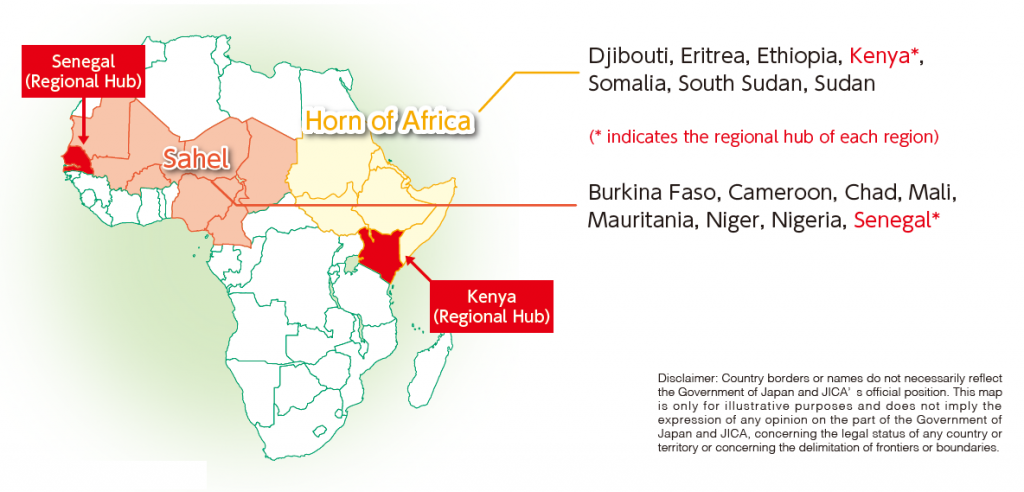
Institutions and organizations involved in the Initiative in each country are those responsible for forestry, the environment, farming, agriculture and natural resources related sectors.
Co-organizers
・Ministry of Environment and Forestry, Republic of Kenya
・Ministry of Environment and Sustainable Development, Republic of Senegal
・Japan International Cooperation Agency (JICA)
・United Nations Convention to Combat Desertification (UNCCD)
*For the implementation of the African Initiative in the Horn of Africa, the Government of Kenya, through the Ministry of Environment and Forestry and the Kenya Forestry Research Institute (KEFRI), in collaboration with JICA, shall organize various activities under the “Capacity Development Project for Sustainable Forest Management in the Republic of Kenya” (CADEP-SFM).
Secretariat
Global Environment Department, JICA
Partner Organization
Food and Agriculture Organization of the United Nations (FAO), Global Environment Facility (GEF), Permanent Interstates Committee for Drought Control in the Sahel (CILSS), International Centre for Agricultural Research in the Dry Areas (ICARDA)
The African initiative for Combating Desertification is a non-legally binding and flexible frame work. Any organizations which have a will to work together for combating desertification in the Sahel and Horn of Africa are welcome to be a Partner Organization. Partner Organizations of the initiative are expected to contribute to the initiative by co-hosting workshops and events, sharing their expertise and experiences, and any other joint activities to accelerate the efforts for combating desertification in the region.
Focal Point of the Participating Countries
Horn of Africa
- Djibouti : Mr. Ahmed Mohamed Ali , Director of Agriculture, Ministry of Agriculture, Water, Fishery, Livestock and Aquatic Resource
- Eritrea : Mr. Heruy Asghedom, Director General, Agricultural Extension Department, Ministry of Agriculture
- Ethiopia : Dr. Teshome Tamerat, Ministry of Environment, Forest and Climate Change
- Kenya : Mr. Richard Mwendandu, Director, Multilateral Environment Agreements, Ministry of Environment and Natural Resources
- Somalia : Mr. Kenadid Mumin Cali, Deputy Director, State Minister for Environment Affairs, Federal Government of Somalia
- Sudan : Dr. Abdelazim Mirghani Ibrahim, General Secretary, National Council for Combating Desertification
- South Sudan : Dr. George Louise T. Tadu, Directorate of Research and Training, Ministry of Agriculture and Food Security
Sahel
- Burkina Faso : Mr. Lazar Dambatia Tagnabou, Water and Forests Inspector, Permanent Secretariat of the National Council for Sustainable Development
- Cameroon : Mr. Payang David, Ministry of Environment, Nature Protection and SUstainable Development
- Chad : Mr. Maïbe Komandje, Ministry of Environment and Fisheries
- Nigeria : Mr. Bala Haruna Gukut, Deputy Director (Drought and Desertification) , Federal Ministry of Environment
- Niger : Mr. Ibro Adamou, Deputy Director General of Water and Forests, Ministry of Environment and Sustainable Development
- Mali : Mr. Kaba Diallo, National Directorate of Water and Forests
- Mauritania : Mr. El Hor Mohamed, Directorate of Protection of Nature
- Senegal : Mr. Baidy Ba, Director of Water, Forest, Hunting and Soil Conservation Directorate, Ministry of Environment and Sustainable Development
